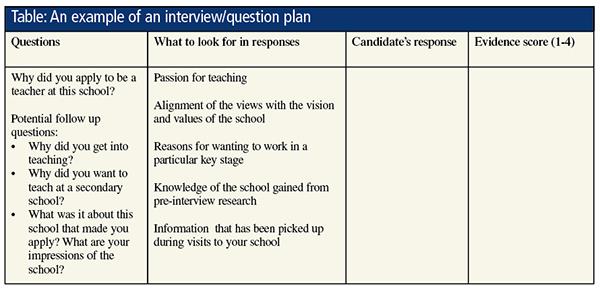Opening your door to new talent can have a welcome impact on the positivity, performance and morale of everyone in your team – as long as you can find the right people. Once you’ve got your shortlist of potential candidates, perfecting the interview process will make sure you identify those who are the right fit for what you need.
Arrange interviews for a date and time that best suits your school
Get in touch with your shortlisted candidates as soon as possible to arrange an interview for whenever best works for you. Try though to be flexible and allow candidates to carry out childcare responsibilities, take part in religious occasions, or fit the interview around their current working hours.
For candidates who live far away, you might want to arrange the interview for later in the day so they won’t have to stay overnight. Alternatively, you could do the interview over the internet via a tool like Skype.
Select your interview panel
In most cases, there’s no set number of people you must have on an interview panel. However, it’s good practice to have three people, or five for more senior roles. Having an odd number will allow a split decision if not everyone can agree on who should get the job.
In terms of who should be on the panel, it’s good practice to include the line manager for the role, then consider people with interviewing experience and those who know the most about what the role entails.
Make sure at least one member of the panel has undertaken safer recruitment training. This is a requirement in maintained schools, but it’s also good practice for academies, as explained in the DfE’s staffing and employment advice.
The only time panel membership is set by legislation is when interviewing for a headteacher or deputy headteacher at a maintained school. In this case, it is up to your governing board to select at least three of its members to take part. These cannot include the headteacher or deputy headteacher.
Plan your questions and interview tasks
You will usually want no more than 10 main questions for an hour-long interview. When preparing your questions, use the person specification as your basis for competency-based questions, and weight these competencies to help you decide which are the most important.
Try to keep questions open-ended. Avoid anything that can be answered with a “yes” or “no”, so that the candidate does most of the talking. Make a note about what you would expect to see in an answer, such as certain topics you would like covered, and create follow-up questions if you want to direct interviewees towards these areas.
Do not ask about personal views irrelevant to the job or topics related to the candidate’s gender, age, sexuality or other “protected characteristics”. For example, avoid questions about childcare arrangements, living arrangements, plans to get married, to have children or to retire, etc.
You may, however, be able to ask about certain protected characteristics where relevant to an occupational requirement of the role, such as the religion of an RE teacher at a faith school. Always get HR support with devising a question like this.
Furthermore, don’t ask anything about a candidate’s disability or health and how it relates to their ability to do the role. Equality law stipulates that you cannot ask about this until you make a conditional job offer.
Assign “evidence scores” to the candidate’s answers. This can help you to prevent bias and avoid making snap judgements based on “gut feeling”. Keeping a record also means you have evidence of your decision-making should a candidate challenge your final decision. Bear in mind they can make a request under the GDPR to see the contents of the form, so be careful what you write. Below is an example of an interview/question plan.

Set interview tasks tailored to the role
If you want to see how the candidate performs in practice, set them a task to do before or after the interview. You might like to see how the candidate engages with pupils by setting up a formal discussion with a designated group, or allowing the candidate to talk to pupils more informally during lunch time. Another option, depending on the role, might be to ask the candidate to give a presentation. You could ask them to prepare and present on a particular topic – which will allow you to assess their enthusiasm, and whether they have researched your school sufficiently well to tailor their presentation.
Let the candidates know about the outcome quickly
Get in touch with your preferred candidate and offer the job as soon as possible. If they decline, consider offering the job to the next most suitable candidate, and repeat this process as necessary. Call the candidate for a more personal touch but follow this up with a written confirmation and a deadline to respond by.
If they accept, you can proceed to doing the necessary pre-appointment checks, in line with the latest statutory safeguarding guidance.
Once an offer has been accepted, call your unsuccessful candidates – this is more personal, and good for your reputation as an employer. On the call, let them know the outcome immediately without dragging it out, and move quickly on to giving them positive feedback, highlighting what they did well, before explaining the reasons why another candidate was successful. Always thank them for their time and wish them well in the future.
- Imogen Rowley is a lead content editor at The Key, which provides leadership and management support to schools. Visit https://thekeysupport.com/
Further information
- Staffing and employment: Advice for schools, Department for Education, February 2017 (last updated October 2018): http://bit.ly/2MeqN9t
- The School Staffing (England) Regulations 2009: http://bit.ly/2Ru1wxY
- The Equality Act 2010 and schools, Department for Education, May 2014: http://bit.ly/2TSoECS
- Subject access requests: guidance and template forms, The Key, November 2018: http://bit.ly/2DdKgo8
